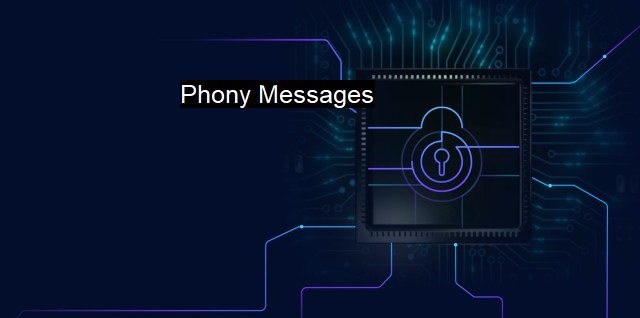What are Phony Messages?
Falling for The Bait: The Ever-Present Danger of Phishing Messages and Scams in Today's Digital Landscape
In the current digital era, cybersecurity has become a necessity due to increased cyber threats. One of the forms of fraud frequently encountered by individuals and organizations in the cyber environment is known as "phony messages." Phony messages are deceptive or counterfeit messages typically disseminated through digital platforms such as emails, text messages, or social media platforms, usually purporting to be from trusted legitimate organizations or contacts. They are designed to trick people into divulging sensitive information like passwords, banking details, or credit card numbers.Phony messages play on human emotions by creating a sense of fear, urgency, or curiosity. For instance, some might notify users that their account has been compromised and demand immediate attention, encouraging the reader to click on a malicious link or download corrupted files. Other messages might lure users with false promises like lottery wins or other enticing deals, prompting them to enter sensitive details.
With phony messages serve as vehicles for several types of cybercrimes. They may carry out a 'phishing' attack, which seeks to trick a person or organization into giving up precious private data like usernames, passwords, and credit card details, often under the guise of a genuine request. 'Spear phishing' is a more targeted form, where specific individuals or companies are targeted.
Phony messages can also propagate 'ransomware,' malicious software that locks the computer or personal files until a ransom is paid. Similarly, they can serve as a gateway for viruses and 'malware,' which are programs intended to damage or disable computers and computer systems.
Antivirus software plays a critical role in protecting against these cyber threats stemming from phony messages. Antivirus programs screen and filter the incoming data from emails or downloads and remove any potential threats. They check for known types of viruses, monitor the behavior of all programs, and raise an alert if they detect something suspicious. They also regularly update their virus definitions to keep pace with the constantly evolving threat landscape.
Firewalls, another critical line of defense in the cybersecurity infrastructure, control access to the network by blocking unauthorized access while letting in authorized communications. Combined with antivirus software, they form an active, robust defense system against rootkits, worms, trojans, and other forms of malware spread through phony messages.
Educating oneself about the possible risks, being vigilant while dealing with unfamiliar or unexpected digital communications, and maintaining up-to-date safeguards are some crucial steps one can take in the face of increasing cybersecurity threats. no security measures can guarantee complete protection, and thus the responsibility lies with individuals to approach their digital encounters judiciously.
Phony messages represent one of the significant pathways for carrying out cyber threats. They trick users into performing actions that either compromise their devices or risk sensitive information. Cybersecurity measures like updated antivirus software and firewalls, coupled with user awareness and security practices like regularly changing passwords, cautious interaction with electronic communications, and strict adherence to privacy rules, are recommended protection against these threats. Remember, the cyber landscape is continually evolving, and so too should our understanding and actions toward it to secure the digital future.

Phony Messages FAQs
What are phony messages in the context of cybersecurity and antivirus software?
Phony messages are fake alerts or notifications that appear on your computer or mobile device, designed to look legitimate but actually created by cybercriminals. These messages aim to trick you into clicking on a link, installing malware, or providing personal information.How can I differentiate between a phony message and a legitimate one from my antivirus software?
Phony messages often contain spelling or grammatical errors, use urgent or threatening language, and request personal information or payment. Legitimate messages from your antivirus software will typically come from a trusted source and provide specific details about the issue at hand without asking for personal information.What steps can I take to protect myself from phony messages?
To avoid falling victim to phony messages, it is important to keep your antivirus software up to date, be cautious of suspicious emails or texts, and verify the legitimacy of any notifications by contacting your antivirus provider directly. Additionally, avoid clicking on links or downloading attachments from unknown sources.What should I do if I receive a phony message or suspect that my computer has been infected with malware?
If you receive a phony message or suspect that your computer has been infected with malware, do not engage with the message or click any links. Instead, disconnect from the internet and contact your antivirus provider immediately. They can help you remove any malware and protect your device and personal information.| | A | | | B | | | C | | | D | | | E | | | F | | | G | | | H | | | I | | | J | | | K | | | L | | | M | |
| | N | | | O | | | P | | | Q | | | R | | | S | | | T | | | U | | | V | | | W | | | X | | | Y | | | Z | |
| | 1 | | | 2 | | | 3 | | | 4 | | | 7 | | | 8 | | |||||||